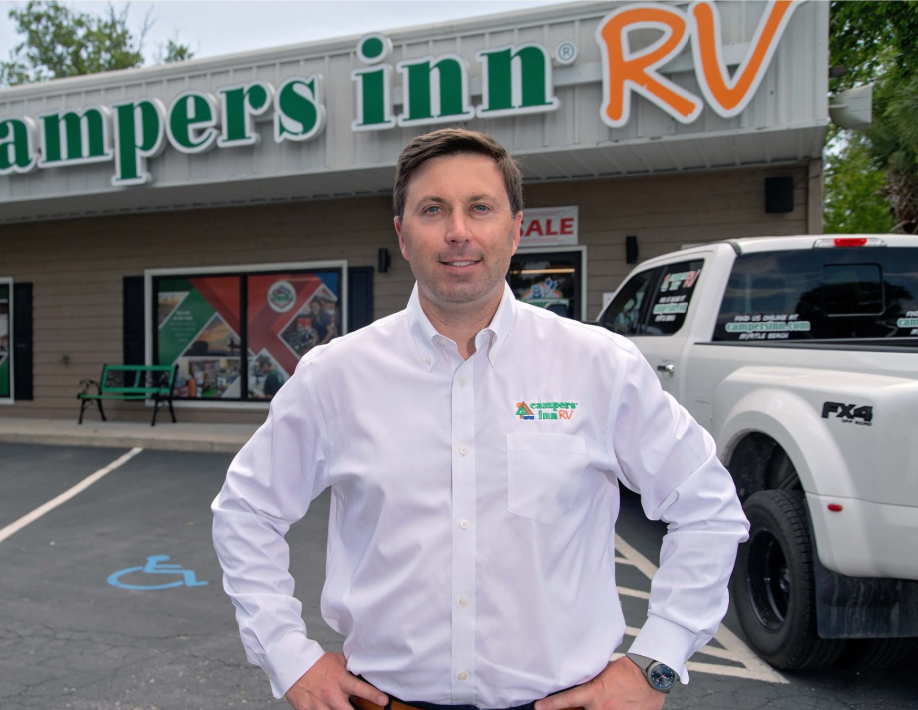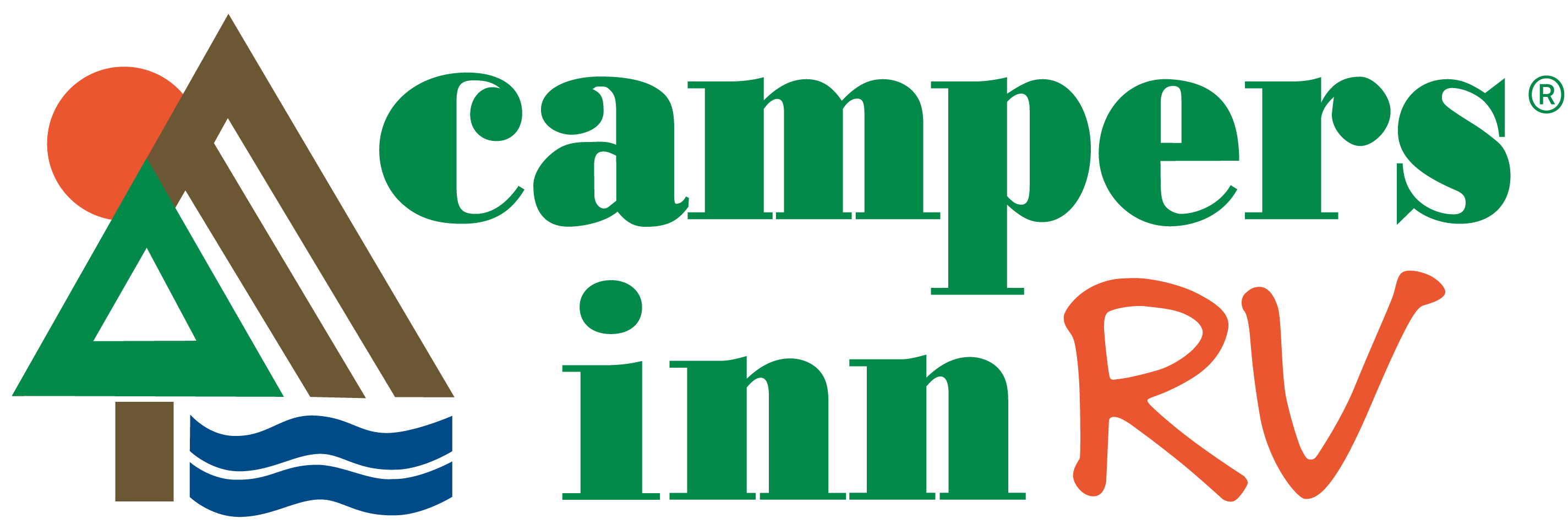
Grocery stores, drug stores, apparel retailers and big-box stores often work with suppliers to create their own brands.
The products are referred to as store brands or private-label products. The brands are controlled by the retailer, providing opportunities to offer low-cost alternatives or value-added competitions to name brand products.
In the RV industry, RV dealers and dealer chains have begun adopting the private labeling strategy of many other industries by asking RV manufacturers to build privately labeled vehicles exclusively for their dealer locations.

Affordability is Key
Numerous reasons lead retailers to create a private-label sales strategy. Affordability is typically among the most important.
Campers Inn's Daniel Knight began his career at a separate RV dealer, where he led a dealership location to record-breaking sales. He brought a private-label sales background to Campers Inn eight years ago. The dealer chain's private-label strategy was already underway when he joined. Campers Inn worked with Gulf Stream Coach and Cruiser RV to create the Friendship and Embrace brands.
The company’s strategy evolved from a private-label, higher-margin, limited models sales concept under Knight's leadership.
“We did not see that model as being the effective plan for Campers Inn RV in a competitive towable market,” he said. “After the Covid selling years, we knew there was an opportunity to improve our towable sales. Here we are with a slightly different strategy in recent years, and it continues to evolve here in 2025.”
Providing affordable private-label offerings is now driving Campers Inn's strategy. Knight said pursuing affordability was not intended to become a race to the bottom as he has seen with some other dealers.
“We have not been as focused on hitting the bottom price point… where you are very unlikely to return a quality net profit to the dealership, and benefit a sales organization without a significant increase in volume, which requires added personnel, pay changes, variable costs and more,” he said. “We respect the strategy of others to sell a larger volume of lower-priced inventory, considering the affordability of RVs indeed brings customers into dealerships. However, we are typically a more premium-focused, service-oriented and relationship-driven dealership group. Our private-label strategy helps open the door to new opportunities in many of our markets where customers would prefer an improved or premium buying experience at an affordable price.”
Campers Inn's privately branded vehicles are not core focused on the $10,000 to $20,000 price, although they will include those models on a limited basis. Most of the company’s private label RVs start around the $19,995 price point. Other vehicles are priced at $24,995, $29,995 and $34,995.
“Affordability is more common right now than it has ever been before,” Knight said of private-label sales. “The ability to work with a manufacturer to provide enjoyable towable floorplans, with key content and features that matter at that level of affordability, is of importance to us.”

The Right Stuff
Retailers agree that simply providing a cheap RV with a private-label brand is not the goal. Dealerships seek to determine the key features and benefits consumers require while working with manufacturing partners to lower costs elsewhere and provide affordability.
Key features Campers Inn includes in its private brands are power jacks, upgraded front caps to create a better visual appeal, stylish exteriors and an upgraded entry step.
“There are a variety of ways we could go,” Knight said. “We want to be more on trend with current technology, appearance and features, while removing some of the basic looks, and the not-so-important technology.”
Knight cited solar power as an example. He said solar panels on a 12-foot, single-axle trailer are likely not important to the consumer, but a traditional travel trailer with more premium content might require solar power and solar capability.
“There are just some features we would add and some features that we believed that we could take away,” he said, “and still create a phenomenal camping experience at an affordable price.”
Retailers have various methods for determining the features and benefits consumers require.
Knight said Campers Inn relies heavily on market share reports, including internal and external data, to monitor sales trends and the common attributes of top-selling RVs. The data and reports helped lead the dealer chain's strategy towards private label integration.
“We are learning from all of it and trying to determine how we can incorporate some of that feedback,” he said. “We are trying to take it all in and figure out how to build what the customer wants.”
Model Variety
Campers Inn features three private-label brands. Embrace-branded laminate travel trailers are made by Cruiser RV. They range from 21 feet to 38 feet long. Forest River-built Westbrook-branded stick-and-tin travel trailers are 20-foot-long, single-axle RVs weighing 3,700 pounds dry. Venture/KZ-built CampBound-branded stick-and-tin travel trailers range in length from 16 feet to 30 feet.

Building a Winning Strategy
Another aspect of a private-label strategy is the ability to offer a broader RV selection in markets where franchise agreements limit brand availability.
In crowded markets, dealers might be unable to offer a full lineup of towables and motorhomes. In the Dallas-Fort Worth, Texas market, upwards of 20 RV dealerships serve the metro area. A dealership seeking to enter the market could have difficulty signing a franchise agreement with a manufacturer's brand not already represented.
Private-label brands provide a dealership with additional selections from manufacturers already in the market, similar to mirror brands such as Forest River's Flagstaff and Rockwood.
Knight said the strategy can work in crowded markets. Knight said Campers Inn is still more likely to partner with, or seek a more well-known quality manufacturer brand within a market, to establish itself in a market. Then, Campers Inn uses its private-label brands to enhance the store's inventory and marketing capabilities.
“In certain markets, private label certainly proved to be something very fruitful to add to our inventory mix,” he said. “In some markets, it was not necessary because there are either opportunities with a manufacturer or brand to grow outside of private label, or opportunities to grow share and profitability through more impactful products.”
Knight said a more strategic piece lay in the ability for a multi-store dealer chain to train on, sell and market the same RV brands in a majority of locations.
By controlling RV invoices, Knight's private-label brands remain consistent across the company’s 41 nationwide locations. Individual store managers cannot order unique or different floorplans that might connect with specific local consumers.
Knight said store-specific RVs can and will be successful and a large part of the company’s strategy, particularly among premium-branded towable products. He said he does see a pathway to increasing sales with a nationwide private label marketing strategy. He acknowledged the private label strategy could short-change some stores of higher-margin opportunities if private label products replaced already impactful RVs.
Knight said, “It can actually be a hindrance for us to drive a certain price point or cross-merchandise at an agreed-upon set sales price at all our locations. We will continue to monitor that, as we would our entire mix and product portfolio.”
The concept of having the same RV brands at multiple locations eases the sharing and selling opportunities for dealerships and improves the company’s ability to manage order quantities and stocking levels.
The private-label strategy enables Campers Inn to cross-train sales and service employees and better oversee quality and reliability. The strategy provides necessary feedback to a manufacturer, enabling the dealership and manufacturer to quickly adapt to the market supply needs, improve quality or pivot when necessary.
Disclaimer: This article was originally published by RV News in their Aug 2025 issue. To read the full article, click here.



